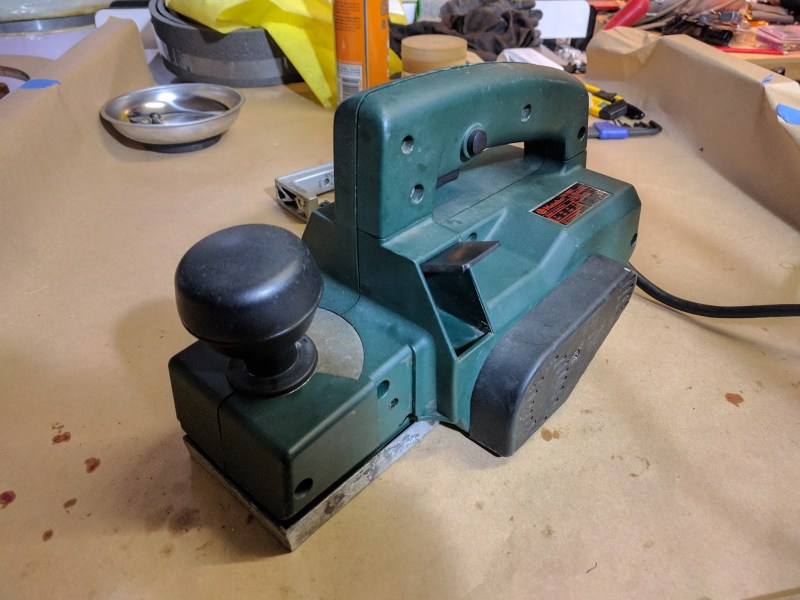Having the right tool for the right job is not always possible, but it’s an ideal that’s nice to try to live up to. The problem is that a lot of the time, the right tool is often very expensive. We have found lots of ways around this, though, from building our own CNC machines to finding new ways to electroplate metal. Sometimes, though, the right tool for the job doesn’t have to be improvised or built from scratch, it just falls in your lap.
Admittedly, [Sam]’s power planer didn’t literally fall into her lap, but she did pull this neglected tool from the garbage. With no idea what was wrong with it, [Sam] let it sit on the shelf for years until she finally needed it. Assuming there was a major problem with the tool, she set about replacing the blades and bearings only to find that the likely culprit behind why the planer was thrown away in the first place was a faulty switch. This was likely a deal and circuit-breaker for someone who would use it all day, but not so for someone who only needs it for occasional use.
While some might not consider this a “hack”, it is at least a reminder that one man’s trash is another man’s treasure, especially if that trash only needs new bearings and a switch. There are two lessons here: first, that tools aren’t usually beyond repair, and that it’s possible to find all kinds of tools in the dumpster from people who don’t heed this advice.
















I pulled a Bosch blue tool case out from under some broken tiles in a skip whilst on a run one night, to find a $800 Bosch rotary hammer inside, with a mess of duct tape around the cord and gland, holding it in a particular orientation; doesn’t take a rocket surgeon to work out the score. $5 worth of plug and cord later, so far I’ve got dozens of holes and about 10 hours of chiseling/jackhammering time put on my free $800 tool without hint of a fault.
Lesson: Wire fatigue at the tool body probably sends more power tools to landfill than any other cause. Always continuity check before sending out for repair.
I also wonder how much the burden of getting the OH&S test and tag done, on top of the actual repair, would affect a tradesman’s decision to throw out an obviously repairable tool?
+1. Most of the time its as the cable enters the tool, most of the remaining time its at the plug.
People seem to have this bad habit of wrapping the cord around the tool.
Wrapping the cord around the tool is a most practical and space efficient way of dealing with it. If a manufacturer has not provided a way of dealing with the cord, wrapping is inevitably going to happen.
If everyone does it, the design is to blame for not being able to deal with it and not the user.
Correct, especially with stiff PVC cables, prone to failure with greases attacks.
That’s why I change the ever too short cables with a long (5m) rubber cable, they cost 8€ on eBay and change your life, cordless power-tools are not needed anymore with this quick hack.
or make the cable very short, like 20cm, and use an extension cord.
Then you have to carry an extension cord everywhere you want to use it.
Black and decker did that in the 80’s, hated that.
wrapping is ok as long as you make the first loop loose so you don’t stress the cable entry
Yes, that’s the important “trick”. Also with countless power packs.
Repairing stuff just ain’t worth the time for a professional. They need to get back on the job ASAP and may not have the knowledge or confidence to do it. Builder friend of mine won’t even touch a frayed cable; he’s terrified of electrickery. Just buy a new tool and write it off or bill the customer!
Dumpster tools? I’ve salvaged a huge Hitachi hammer drill complete with around 20 large bits, a Bosch tackgun, a clawhammer, several screwdrivers and pliers, boxes of screws. Best find: a Black & Decker Workmate
I have rescued a drill that had a bad button. More often than not my stuff deals with people plugging DC adapters of the wrong polarity in and blowing a diode or simply overloading a cap aka “it died, put it in my closet, pulled it back out a month later and it works now” fix haha. In this realm it is a great time to be alive.
Sounds like you folks have some nice finds :) It is always good to hear things are finding new lives.
Once found a guitar amplifier on the street (no name brand but the case was in good condition). Took it home, opened it to look at the circuit. Seemed just fine so plugged it in. Power worked ok, but not even a static hiss from the speaker. Opened the speaker section, lo and behold, one of the speaker wires terminals was disconnected. That was the only flaw in the amplifier…
Since I had no use for the amp, gave it to a friend who plays guitar.
There’s another side to repairing junk tools. I picked up a nice-looking compressor for just $35. Nothing obviously wrong except the power cord. “Heck, that’s easy!”
Underneath the external cover was another story. The whole thing was busted. Maybe the tank is good. Or maybe not. The piston will make a neat paperweight.